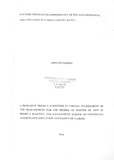| dc.description.abstract | The purpose of the study was to establish the factors influencing Non Governmental Organisations (NGOs) operations in rural development initiatives in Garissa County, Kenya. Three research objectives guided the study. The researcher adopted descriptive survey design in carrying out the study. The target population of the study was 5 NGOs working in the district where three head of departments and 12 operations managers from each organization were used in the study. Data was collected by use of questionnaire and was analyzed both quantitatively and qualitatively. Findings of the study revealed that NGO related factors influence operations in rural development initiatives as indicated by majority 12(80.0%) of heads. Majority 8(53.3%) of the heads of operations agreed that the NGO acts both as service providers and advocates for the poor. Pearson Correlation Coefficient analysis showed that there was a positive relationship (0.68) between NGO related factors and NGO operations. On the influence of insecurity on NGOs operations, the study revealed that security factors influence operations in rural development initiatives as indicated by majority 8(53.3%) of heads. This implies that the humanitarian services on the NGO are limited as the area is ill-equipped to the attacks. Pearson Correlation Coefficient analysis indicated that there was strong positive (0.75) relationship between security and NGO operations. Findings on the influence of government environment on NGO operations indicated that Government factors influence operations in rural development initiatives as shown by majority 12(80.0%) of heads Pearson Correlation Coefficient analysis showed that there was a positive relationship between the two variables as indicated by a correlation of 0.58. The results indicated that government related factors influenced NGO operation. Based on the findings of the study, the study concluded that NGO related factors influence operations in rural development initiatives and that the NGO acts both as service providers and advocates for the poor. The study further concluded that NGO were not willing to engage in political dimension as indicated by majority of the heads. The study further concluded that security factors influence operations in rural development initiatives and there was violence against aid workers while heads agreed that the area experienced active armed conflict. It was further concluded that government factors influence operations in rural development initiative. Based on the findings of the study, the study recommended that the government agencies should work in corroboration with the NGOs in coming out with suggestions to address challenges faced by the NGOS in their operations and to eliminate the difficulties that NGOs face in remaining nonpolitical, the NGO operations should have a strong political dimension, even within service delivery and welfare provision. Taking the limitations and delimitations of the study, the study suggested that since the study was taken in one administrative county, there is need to carry out a similar study in another area so as to compare the findings. | en_US |

